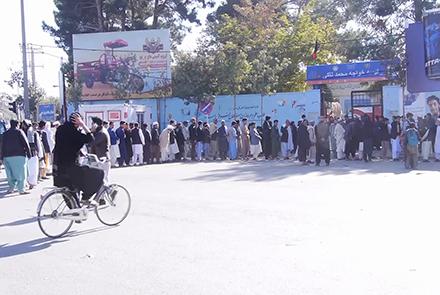The Independent Election Commission (IEC) has yet to begin the transfer of data from the biometric identification devices to its main servers, according to the IEC’s department of IT.
The head of the IT department said that up to now, it has received biometric identification devices from only some eastern and central provinces of the country including some devices from polling stations in the suburbs of Kabul city.
The transfer of data from biometric identification devices to the main servers will start once all of the devices have arrived at the IEC’s headquarters in Kabul, said the IEC.
The use of biometric devices was the result of government’s decision to hold a transparent election – following increased pressure by political parties.
Almost 22,000 biometric devices were purchased by government from a German company. The distribution to some provinces of the devices was delayed and election employees had problems using the new system on election day.
The government allocated $20 million to purchase these biometric devices.
“All necessary measures are in place, servers have been checked, we are waiting to receive more devices to start the process of transferring data to the servers,” said Sayed Ibrahim Sadat, head of the IT department of the IEC.
Meanwhile, a number of election candidates in Kabul reiterated their calls to the IEC to invalidate votes at the centers where voters were allowed to cast their ballots without going through the biometric identification process.
But the IEC on Monday overturned an earlier decision on this issue and said it will count the votes where voters’ details were not entered into the biometric system, arguing that the voting process continued on the basis of the voters list at polling stations where biometric devices did not work. They said there was no reason to disqualify these votes.
But election watchdogs have expressed doubt over the IEC’s capacity to separate fraudulent votes from valid votes.
Previously the IEC pledged to not include votes of people whose details had not been included in the biometric system.
The IEC also said that telecommunication companies did not show a willingness to connect the biometric devices to internet services on the days of elections therefore the devices were used offline.
“If the issue of biometrics is not considered and it is not recognized, this would mean that the government has spent all the money for fraud,” said one parliamentary election candidate Obaidullah.
“They should stop the fraudsters to avoid a tragedy,” election candidate Azizah Afzali said.
“If they do not meet our demands, in the north, we will block Baghlan-North highway and will cut off transmission lines from north to the south,” a parliamentary candidate from Baghlan Hamed Poya said.


Comment this post